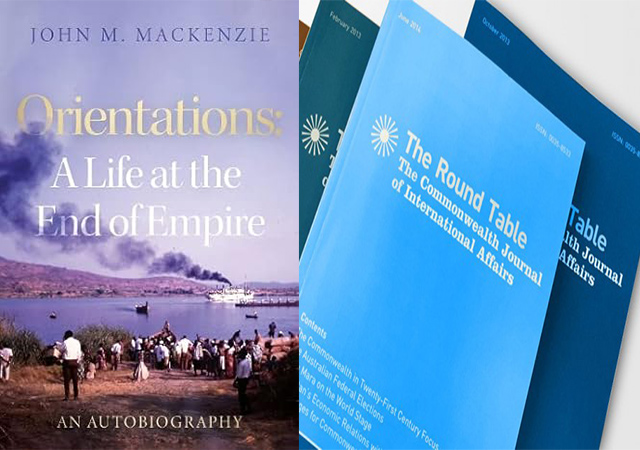
[This is an excerpt from an article in The Round Table: The Commonwealth Journal of International Affairs.]
This volume concludes with a 15-page list of the ‘Principal Publications’ (only the principal!) of John M. MacKenzie. There can be no doubt of his position in the forefront of Imperial History – opening up new, often inter-disciplinary or comparative approaches, engaging with a wide variety of sources beyond the archives and in popular culture, participating robustly but courteously in controversy (with followers of Said, with Bernard Porter over the political and cultural impact of imperialism in the home countries), encouraging younger scholars and establishing the highly influential and still expanding Studies in Imperialism series of Manchester University Press.
His autobiography, in part a response to a cancer diagnosis in 2008 and, happily, a full recovery, is an intensely personal account of his life and experience. It might be subtitled, ‘The Making of a Historian’ or even ‘Apologia Pro Vita Sua’.
All historical work is subjective. Historians are influenced by contexts and among these are the significant life experiences of the author, as well as the range of personal and intellectual effects exerted upon him or her. (p. xi)
Commonwealth Bookshelf: The Round Table recommends
Commonwealth Bookshelf
The book is among other things a memoir of childhood, and of coming of age and coming out. MacKenzie is brave enough to reveal his insecurities stemming from a background in an aspiring working-class family in Glasgow, a relatively undistinguished first degree and exclusion from the perceived academic elite of the Oxbridge and London Golden Triangle. He is not afraid to reveal his emotions, comfortable in his sexuality and rejoicing in nearly 40 years of a loving, fulfilling same-sex partnership. He is unashamedly enthusiastic about his love of music, theatre and travel (especially by sea cruises), Scotland, and uncovering imperial links and legacies in sometimes out-of-the-way places. He is frank about his political views – his hatred of Mrs Thatcher and Thatcherism is visceral and vitriolic.
He does not separate his intellectual interests from the rest of his life but shows how they were shaped by his family, friends and background. He grew up in Glasgow, which he later recognised as an ‘imperial city’ fascinated by its built environment and maritime and industrial traditions. As a young boy, he spent time in Northern Rhodesia/Zambia where his father was engaged by the Public Works Department, experiencing first-hand life and race relations at the end of empire. He soon left behind his childhood ambition to become a District Officer and later his religious faith (he wondered briefly whether he might become a minister). There remained a fascination with Africa and empathy with Africans and his earliest academic work, after a flirtation with archaeology, was as an Africanist historian. Likewise, throughout his career, he would befriend ministers and missionaries and maintain a deep respect for Christian especially Church of Scotland traditions and contributions to culture and identity worldwide.
From 1968 (when this new university was in its infancy) to retirement in 2002, his academic home was the University of Lancaster, where somewhat to his surprise and sometimes to his discomfiture he became heavily involved in university administration and politics, while continuing to fit in ongoing research, teaching and travel. He also served on the Magistrates Bench – a day a week away from the university, his form of ‘Bunburying’. When the definitive history of the new universities is written, MacKenzie’s account should have at least a few footnotes.
Terry Barringer is the Assistant Editor and Books Editor of the Round Table Journal.
Orientations: a life at the end of empire: an autobiography by John M. MacKenzie, Market Harborough, Matador, 2023.



